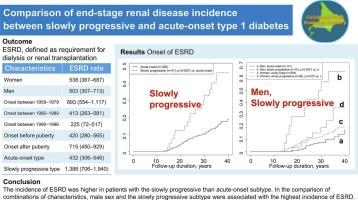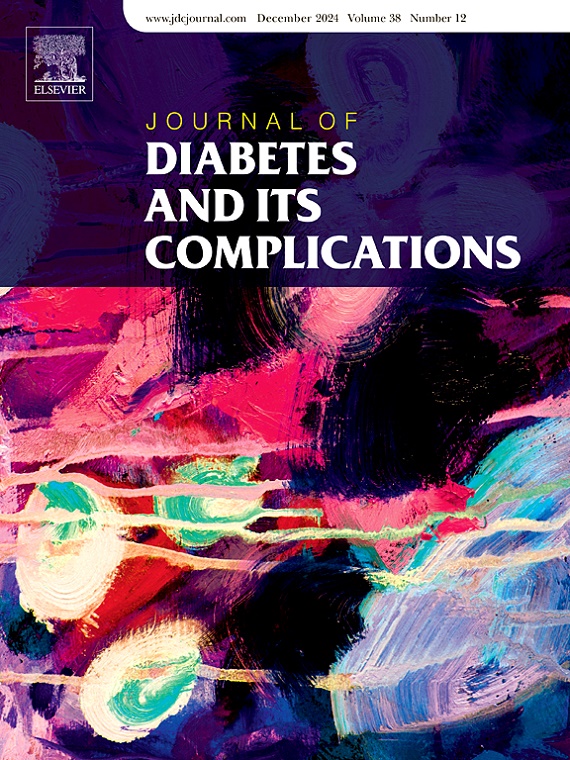儿童期发病的缓慢进展亚型1型糖尿病是终末期肾脏疾病的高危因素:日本的一项队列研究
IF 2.9
3区 医学
Q3 ENDOCRINOLOGY & METABOLISM
引用次数: 0
摘要
目的比较慢进展型1型糖尿病与急性发作型1型糖尿病终末期肾病(ESRD)的发生率。方法本队列研究纳入了1959 - 1996年日本北海道地区521例儿童期发病的1型糖尿病患者。我们按性别、发病年份、发病年龄和1型糖尿病亚型(缓慢进展或急性发作)计算了每10万人年的ESRD发病率。我们还根据这些危险因素构建了ESRD的Kaplan-Meier曲线。结果共收集391例患者资料,其中66例发生ESRD。所有患者的ESRD发病率为每10万人年525例;女性(n = 235)和男性(n = 156)分别为538和503例;1959-1979年(n = 107)、1980-1989年(n = 201)和1990-1996年(n = 83)发病年份分别为893、413和225;青春期前(n = 243)和青春期后(n = 148)发病分别为420例和715例;缓慢进展亚型(n = 41)和急性发作亚型(n = 350)分别为1388例和432例。Kaplan-Meier曲线也显示缓慢进展型糖尿病的ESRD发生率明显高于急性发作型1型糖尿病。结论慢进展型糖尿病的ESRD发生率高于急性发作型糖尿病。本文章由计算机程序翻译,如有差异,请以英文原文为准。

Slowly progressive subtype of childhood-onset type 1 diabetes as a high-risk factor for end-stage renal disease: A cohort study in Japan
Aim
To compare the incidence of end-stage renal disease (ESRD) between slowly progressive type 1 diabetes and acute-onset type 1 diabetes.
Methods
This cohort study enrolled all 521 patients with childhood-onset type 1 diabetes with the year of onset from 1959 to 1996 in Hokkaido Prefecture, Japan. We calculated the ESRD incidence rate per 100,000 person-years by sex, onset year, onset age, and type 1 diabetes subtype (slowly progressive or acute-onset). We also constructed a Kaplan–Meier curve for ESRD by these risk factors.
Results
The data of 391 patients were gathered, among whom 66 developed ESRD. The ESRD incidence rate per 100,000 person-years was 525 among all patients; 538 and 503 among women (n = 235) and men (n = 156); 893, 413, and 225 for onset year of 1959–1979 (n = 107), 1980–1989 (n = 201), and 1990–1996 (n = 83); 420 and 715 for onset before (n = 243) and after (n = 148) puberty; and 1388 and 432 for the slowly progressive (n = 41) and acute-onset (n = 350) subtypes, respectively. The Kaplan–Meier curve also indicated a significantly higher incidence of ESRD in slowly progressive than in acute-onset type 1 diabetes.
Conclusion
The incidence of ESRD was higher in slowly progressive than acute-onset type 1 diabetes.
求助全文
通过发布文献求助,成功后即可免费获取论文全文。
去求助
来源期刊

Journal of diabetes and its complications
医学-内分泌学与代谢
CiteScore
5.90
自引率
3.30%
发文量
153
审稿时长
16 days
期刊介绍:
Journal of Diabetes and Its Complications (JDC) is a journal for health care practitioners and researchers, that publishes original research about the pathogenesis, diagnosis and management of diabetes mellitus and its complications. JDC also publishes articles on physiological and molecular aspects of glucose homeostasis.
The primary purpose of JDC is to act as a source of information usable by diabetes practitioners and researchers to increase their knowledge about mechanisms of diabetes and complications development, and promote better management of people with diabetes who are at risk for those complications.
Manuscripts submitted to JDC can report any aspect of basic, translational or clinical research as well as epidemiology. Topics can range broadly from early prediabetes to late-stage complicated diabetes. Topics relevant to basic/translational reports include pancreatic islet dysfunction and insulin resistance, altered adipose tissue function in diabetes, altered neuronal control of glucose homeostasis and mechanisms of drug action. Topics relevant to diabetic complications include diabetic retinopathy, neuropathy and nephropathy; peripheral vascular disease and coronary heart disease; gastrointestinal disorders, renal failure and impotence; and hypertension and hyperlipidemia.
 求助内容:
求助内容: 应助结果提醒方式:
应助结果提醒方式:


